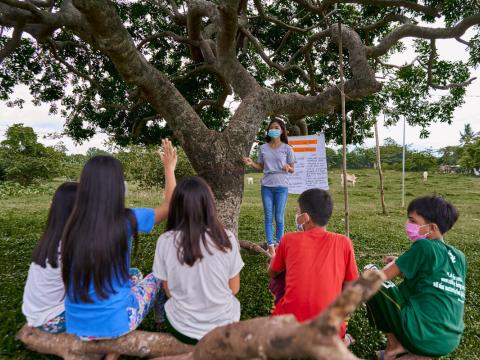The ripple effect of child sponsorship protecting children in the Philippines

What if you could stop a child from becoming the victim of sexual exploitation? What if you could be the reason a teenage girl learned how to keep herself safe? What if she then became a catalyst for change in her community, teaching other kids how to protect themselves from falling prey to online abuse?
Michaela is 16 years old, and like lots of kids her age, she has grown up with the internet. She lives in the Philippines, where almost 80 million people are internet users and, on average, people spend more time online each day than anywhere else in the Asia-Pacific region. The Philippines Digital Strategy, released in 2010, declares access to the internet a human right, and the government has launched a string of initiatives to help make sure that everyone, even kids living in poverty, can get online and access the education and work opportunities that the internet opens up.
Access to the internet has been more important than ever since COVID-19 hit. Schools across the country closed at the start of the pandemic, and 18 months later, only 5,000 of the Philippines’ 27 million public school students had been allowed to return to classrooms. Online learning has become the norm for Michaela’s generation. But while that has opened up new opportunities, it has also created some very real dangers.
According to the Philippines Department of Justice, cases of online sexual abuse and exploitation increased by 264 percent in the first three months of COVID quarantines compared with the year before, with more than 279,000 cases of children reported. The real number of children exposed is likely much higher and we’re now well past those first few months.
Every case represents a child who will carry the weight of their experience for life. According to a 2020 study, the Philippines has become a global hotspot for online sexual exploitation of children, receiving more than eight times as many cases as any other country.
Fortunately, Michaela is not one of them. Thanks to the support of child sponsors like Michaela’s, she has had the chance to learn how to protect herself online – and she’s doing everything she can to protect other young people from the ripple effects of exploitation.

“When adults are encouraging children to do bad things online, the children’s perspective of themselves becomes distorted as well. The children grow in fear, unable to express their real feelings and thoughts.”
One of the dangers, says Michaela, is that young people simply don’t understand that while the internet can be a powerful tool, there are also risks that they need to be aware of.
“They think that everything online is okay,” she says. “This is not good. Sexual exploitation can start when young people are naïve.
“Children do not know that their pictures could reach several individuals in various countries. And then, exploited children have fear. They are unable to do something about their situation because they are just children.”
As the pandemic continues to force children to spend more time online, Michaela is taking action to stop more kids in her community from becoming victims of abuse.
“When I’m not studying, I share with other youth what I learned from World Vision youth activities that I attended before the pandemic,” she says.
Armed with posters she has made herself, a stringline, and some pegs, Michaela holds group discussions under a tree, inviting kids to come and learn how to stay safe online.
“There are two things that I usually share with my friends: One, never, ever give your password. And, two, never share your personal information online,” she says.
And kids in her community are listening. Once very shy and afraid to talk in a crowd, Michaela has become a leader.
“My sister is my inspiration and role model,” Michaela says. “We have both been sponsored, and she was a World Vision child leader. I observed what she used to do with World Vision and in school, and I decided to do the same.”

“When I’m not studying, I share with other youth what I learned from World Vision youth activities that I attended before the pandemic.”
It hasn’t been an easy road for Michaela’s family since her father died at the beginning of 2021 – even though she and four of her brothers and sisters are still at school, they are all doing what they can to help their mother make ends meet for the family of 10.
“My parents taught us to be strong. I saw how my mother stood strong after my father died,” she says. “My father, when he was still alive, taught us to learn to stand on our feet.”
Next, Michaela has set her sights on becoming a teacher.
“I enjoy teaching children. It makes me happy to see that they are learning from what I am sharing.”
Michaela is putting what she has learned from her parents, World Vision, and through her sponsor’s support into action – not just for her family, but for her community.
She says, “Joining World Vision activities taught me a lot, such as never giving up on what you want to achieve in life, believe in yourself that you can do things, and be a good leader so other children and youth will follow your good example.”
One child, one reason at a time
You can help a young person like Michaela avoid life-altering exploitation and harm. With global catastrophes putting the lives of children at risk in new and unforgiving ways, there have never been more reasons to